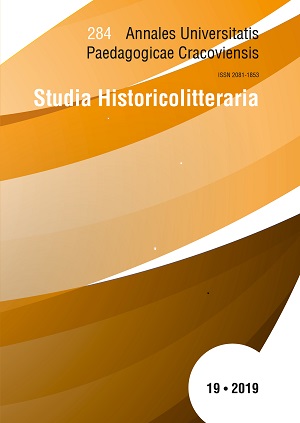Wielopole wielokrotnie: przestrzenna reżyseria afektu
Main Article Content
Abstrakt
The article presents the forms of repetition in the creation and reception of Tadeusz Kantor’s performances. Krakow cellars, Kantor’s home in Wielopole and school class in Bielkowo near Łazy in Pomerania connect here the topic of affective searching and finding sources of identity and memory. The process may refer to both the artist and the viewer, seeking in the memory, art and landscape the traces of himself, recorded in the past and projected onto the surroundings. The author’s discovery of the interiors of the cellars under the floor of the house in Wielopole, similar to the Krzysztofory cellars in Krakow where Kantor conducted the rehearsals of the famous The Dead Class, leads to the conclusion that the preexisting in Wielopole under the floor of a childhood room the space of Kantor’s play can be the source of director’s affective repetition. With the use of the repetition mechanism, numerous further artistic discoveries and meetings of the artist with the self and visions of his future performances have been made. The facilitation of this process for viewers of exhibitions and to the recipients of art, both in Bielkowo and Wielopole, seems to be the inclusion of another tool in theatrical and artistic education.
Downloads
Article Details

Utwór dostępny jest na licencji Creative Commons Uznanie autorstwa – Użycie niekomercyjne – Bez utworów zależnych 4.0 Międzynarodowe.
POLITYKA PRAW AUTORSKICH
Wydawca „Annales Universitatis Paedagogicae Cracoviensis. Studia Historicolitteraria” jest upoważniony do korzystania oraz do rozpowszechniana wszystkich opublikowanych w czasopiśmie materiałów na podstawie umowy licencji niewyłącznej, zawartej uprzednio na czas nieoznaczony każdorazowo z autorem/ką konkretnego utworu na określonych w tamtejszej umowie polach eksploatacji.
POLITYKA OTWARTEGO DOSTĘPU
„Annales Universitatis Paedagogicae Cracoviensis. Studia Historicolitteraria” to czasopismo o otwartym dostępie, a cała jego zawartość jest dostępna bezpłatnie dla użytkowników i instytucji na zasadach licencji niewyłącznej CreativeCommons (CC BY-NC-ND 4.0). Użytkownicy/ki mogą czytać, pobierać, wykonywać kopie, rozpowszechniać, drukować, wyszukiwać lub linkować do pełnych tekstów artykułów w tym czasopiśmie bez uprzedniej zgody wydawcy lub autora/ki pod warunkiem podania źródła dostępu i autorstwa danej publikacji. Jest to zgodne z definicją otwartego dostępu BOAI (http://www.soros.org/openaccess).
Bibliografia
Awangarda w plenerze: Osieki i Łazy 1963–1981, oprac. R. Ziarkiewicz, Koszalin 2008.
Bal M., Afekt jako siła kulturowa, [w:] Historie afektywne i polityki pamięci, red. E. Wichrowska, A. Szczepan-Wojnarska, R. Sendyka i R. Nycz, Warszawa 2015.
Kantor T., Klasa szkolna, [w:] tegoż, Pisma. Teatr Śmierci. Teksty z lat 1975–1984, wybór i oprac. K. Pleśniarowicz, Wrocław – Kraków 2004.
Kantor T., W Centre Pompidou i w Stodole, „Twórczość” 1989, nr 2 (zapis spotkania z 2.12.1983 r. w Klubie studentów Politechniki Warszawskiej Stodoła w Warszawie).
Kantor T., Wielopole, Wielopole, red. B. Borowska, Kraków 1984.
Kłossowicz J., Tadeusz Kantor. Teatr, Warszawa 1991, s. 82–96.
Melberg A., Teorie mimesis, przeł. J. Balbierz, Kraków 2002.
Niziołek G., Polski teatr zagłady, Warszawa 2013.
Panoramiczny happening morski i Tadeusz Kantor w latach 1964–1968, red. J. Chrobak, M. Rogalski i M. Wilk, Kraków 2008.
Pieniążek M., Akt twórczy jako mimesis. „Dziś są moje urodziny” – ostatni spektakl Tadeusza Kantora, Kraków 2005, s. 344–350.
Pieniążek M., Uczeń jako aktor kulturowy. Polonistyka szkolna w warunkach płynnej nowoczesności, Kraków 2013.
Sandauer A., Sztuka po końcu sztuki, „Dialog” 1981, nr 3.
Seigworth G.J., Gregg M., An Inventory of Shimmers, [w:] The Affect Theory Reader, red. M. Gregg i G.J. Seigworth, Durham 2010, s. 1–25.
Sztuka wysokich napięć. Z Jerzym Beresiem rozmawia Łukasz Guzek, [w:] Tadeusz Kantor: Niemożliwe, red. J. Suchan, Kraków 2000.
Tadeusz Kantor nad morzem, red. J. Chrobak i J. Michalik, Gdynia 2009.
